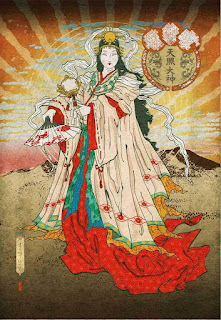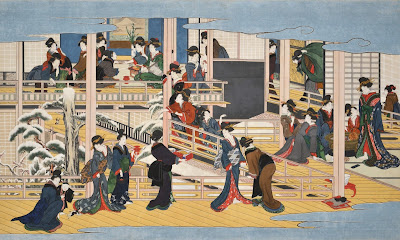Research: Amaterasu Omikami
I've already done several sketches about Amaterasu but I haven't done a proper research so I thought that now was the time.
Amaterasu Omikami
Amaterasu Omikami is considered the most important kami in Shinto religion - she is the Queen of Heaven, the Goddess of the Sun and Universe, the creation itself. Although the role of the creation of the Universe was not hers, she inherit it from her father, the deity Izanagi, who defends the world from the deads.
She has many titles and some of the most well known are: 天照, "Shines from Heaven"; 天照皇大神, "The great and glorious Kami who illuminates from Heaven"; and 大日孁貴神 "the Great Sun of the Kami". The stories about Amatersu appear in the Kojiki ( 古事記, "Records of Ancient Matters") and Nihon Shoki (日本書紀,"Chronicles of Japan") which describes the origin of Japan as an Empire as well as the myths behind the origin of the universe.
According to Kojiki, Amaterasu is one of the three kami (the primary siblings) born from the purification process of her father, Izanagi, as an attempt to save his wife, Izanami, from the land of the dead. When Izagani washed his left eye, Amaterasu was born and then he gave her a necklace of jewels which contained power over the Heavens. Her brother, Susanoo, god of the storm, was born when Izanagi washed his nose and he gave him power over the sees. Finally, Tsukuyomi, the god of the moon and her brother-husband, was bron when Izagani washed his right eye.
The Jingu or Grande Shrine of Ise, Amaterasu's place of worship, is not only the most imporant shrine in Japan but also the shrine of the Imperial Family. In there, there is a mirror, which is part of the three Imperial Treasures of Japan.
Symbols
There are different symbols associated with Amaterasu:
Necklace: as I mentioned before, Amaterasu Omikami received a necklace from her father, Izanagi, in her birth. This same necklace is one of the symbols associated with the Kami
Mirror: the mirror, Yata no Kagami, that reflected Amaterasu is at the moment in the Great Shrine in Ise (central Japan). However, it is not possible to see the mirror itself, only the building in which is stored. Some people say that this mirror has 8 sides, a number that represents the perfection in the Shinto religion. The mirrors are seen as a way to connect with Amaterasu and it reflects the soul.
There is a Japanese proverb that reflects this idea: "When the mirror is dark, the soul is not pure"
The mirror is considered the central symbol of Japanese Shinto and bowing before it is part of a Shinto ritual. People bow three times: the first bow is at the entrance of the shrine building; the second is an act of purification in which the mirror reflects the soul of the viewer; and the third in the shrine's inner sanctum.
Solar Sword: As the guardian of the Japanese people, Amaterasu has to protect her people. The solar sword means that she is able to take them to war if and when necessary.
These three elements (the necklace, mirror and solar sword) are the three emblems of the Imperial Japanese Royalty and the three symbols of Shinto.
I think that this research was really useful for my project since I was not aware that I could incorporate these three elements in my paintings. On my next sketches I will try to represent them or at least one of them so that people can identity Amaterasu Omikami more easily.
Reference
Dumpert, J. (1998). In the Presence of the Goddess: Bowing Before the Mirror in Shinto [online] JSTOR, Available from: http://www.jstor.org/stable/44398684 [Accessed 08.05.2021]Britannica Academic (1998) Amaterasu [online] Available from: https://academic-eb-com.proxy.library.dmu.ac.uk/levels/collegiate/article/Amaterasu/6019 [Accessed 07.05.2021]
Japan City Tour (n.d.) Shinto Goddess Amaterasu Omikami [online] Available from: https://www.tctour.co.jp/info/amaterasu-omikami.html [Accessed 07.05.2021]
Spacey J. (2015) Meet the Gods: 13 Japanese Kami [online] Japan Talk, Available from: https://www.japan-talk.com/jt/new/kami [Accessed 07.05.2021]
Wright G. (n.d.) Amaterasu[online] Mythopedia, Available from:https://mythopedia.com/japanese-mythology/gods/amaterasu/ [Accessed 07.05.2021]



Comments
Post a Comment